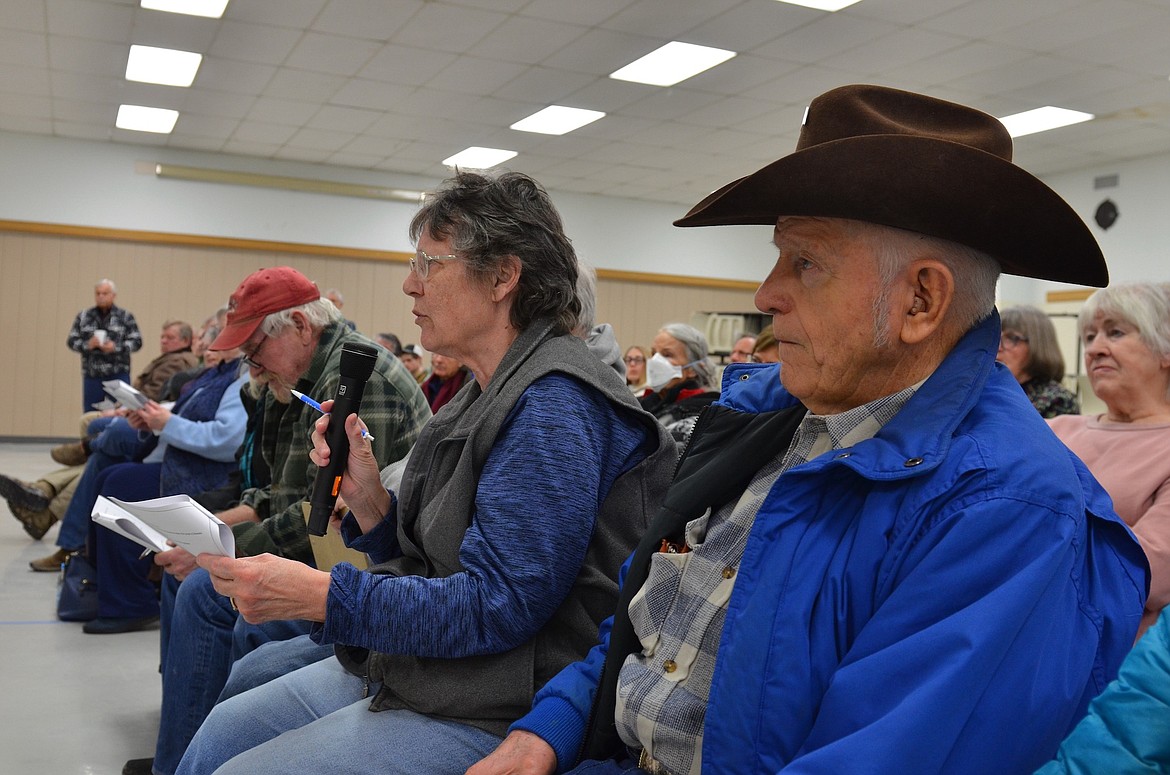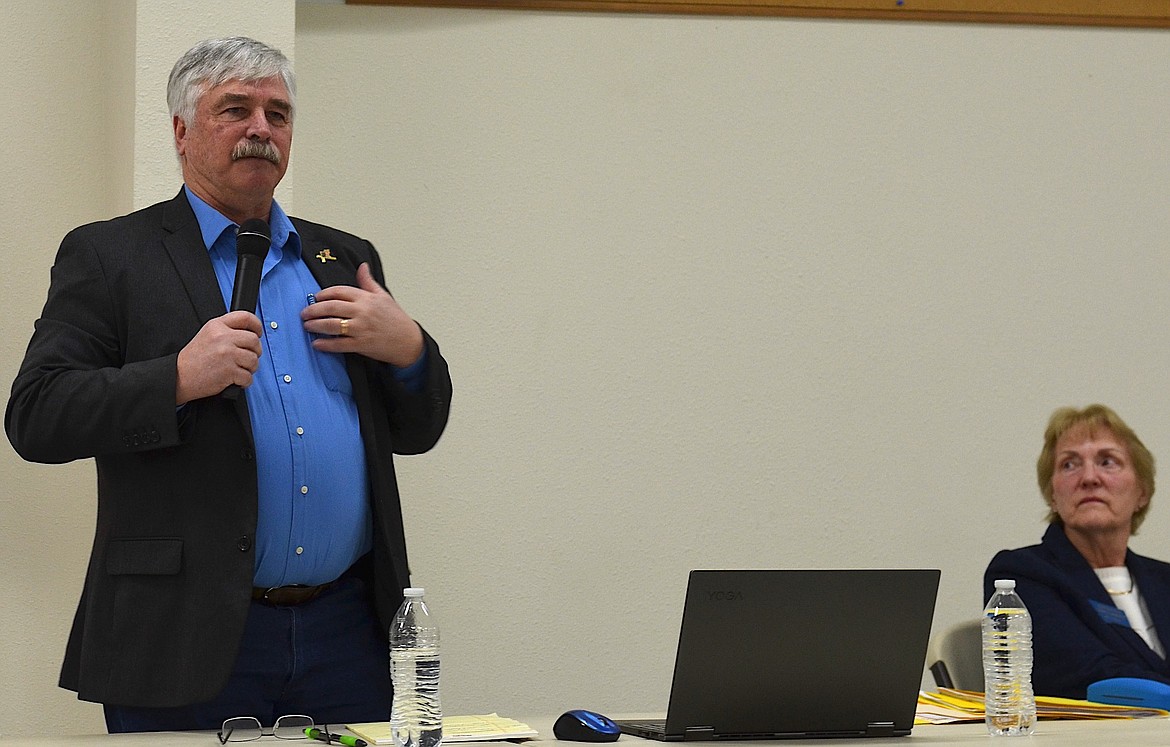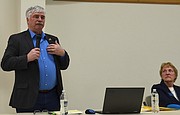Legislators meet with constituents at halfway point
With 1,414 bills introduced in the 2023 session, three Lake County legislators took time out from a hectic process to visit with constituents Monday night at the Ronan Community Center.
The session is at its midway point, known as transmittal, when non-budget bills introduced in either chamber must have enough momentum to have passed in at least one legislative chamber.
Polson Rep. Linda Reksten told the crowd of about 80 constituents that around 800 bills have passed through the House, including 193 last Wednesday and another 93 on Thursday in the final rush to meet the March 3 deadline.
“We’re only halfway through,” she said. “Some of these bills we’ve turned over to the Senate may not go the distance.”
Each legislator took a few minutes to recap their priorities and accomplishments before taking questions from the audience.
For Sen. Greg Hertz of Polson, who chairs Taxation, those include bills already signed by Gov. Gianforte that channel a portion of the $2.5 billion surplus back to taxpayers. These include $480 million in income-tax rebates of up to $1,250 for individuals and $2,500 for married couples; and property tax rebates on principal residences of $500 in 2023 and again in 2024.
The Legislature has allocated $150 million to pay down the state’s general obligation debt, which Hertz estimates will free up around $25 million a year in interest payments. The governor also signed a bill that will invest $100 million in a highway construction fund, enabling the state of access additional federal matching funds for infrastructure projects.
Reksten, who is vice chair of the House Education Committee, touted a flurry of bills she said were aimed at improving student test scores in reading and math, which have been sliding downhill since 2013.
“We’ve worked hard to figure out how we could address these issues and set in motion an improvement cycle,” she said.
Among the legislation that’s been passed over to the Senate are bills that would appropriate funds for targeted intervention for kids in early grades and for a summer Jump Start program “with the overall goal that kids be solidly reading by the end of third grade.”
Enhancing school choice for parents and students was also a committee goal, which resulted in a bill that would mandate open enrollment, allowing students to attend districts other than their own.
“It has created quite a bit of controversy among our superintendents here and across the state,” she said, “but it’s just one aspect” of a package of bills she believes will improve education overall and better prepare students for college or careers.
Two bills that allow school districts or communities to create charter schools to target particular career paths or disciplines also made it out of the House.
Sen. Dan Salomon, who chairs the Senate Education and Cultural Resources Committee and sits on the agriculture and finance committees, mentioned some initiatives that could help speed up certification of college graduates who aspire to teach in their local school districts; establish a health-care trust fund for school districts that would allow them to offer “a better product at a cheaper price” to teachers and staff; and expand the offerings of Montana’s Digital Academy.
HB 15, a bill signed by the governor, provides an inflationary increase for school districts “so they know what they’ll get next year.”
He noted that between tax cuts, rebates, school funding and the infrastructure initiative, and the Legislature has already committed “like a billion and a half” of the surplus.
During the Q&A portion of the forum, retired physician and Arlee resident Mary Stranahan alluded to the extra $2.5 billion. “I’m thinking we have some real problems around the state, specifically around affordable housing, childcare, rural health, rural hospitals and nursing homes,” she said. “Where is the long- term thinking on these big problems affecting Montana?”
Salomon responded that he views the surplus as “a golden opportunity for us to deal with some issues we need to deal with.”
The Legislature has already “given pretty significant rebates, cut some tax rates, done things the governor wanted us to do, now we need to deal with some of the other issues.”
“Who has most the most votes to get certain things done? That’s going to be the entertaining part of the second half of the session,” he added.
An Arlee High School teacher asked Salomon if any help was available in the Legislature to correct the bill passed in 2021 that eased the permitting process for open pit mines – like the 157-acre gravel pit that Riverside Contracting has proposed for the Arlee area.
He noted that under the new law, HB 599, the pit can run around the clock, “so forget about peace and quiet in the Jocko Valley.”
“What can you do about this?” he asked. “We can’t put the profits of a single contracting company ahead of the entire community.”
Salomon agreed that Rep. Steve Gunderson’s bill “went too far,” and said he had tried to set up meetings with the contractor last fall “to talk through this,” but those fell through. He added that at this point in the session, no new bills can be introduced unless they pertain to revenue.
The teacher asked, “Are you going to talk to Rep. Gunderson?”
“I can do that,” Salomon replied.
On other local issues, Hertz was asked about legislation that would fund Public Law 280, the agreement between the state, Confederated Salish and Kootenai Tribes and federal government that makes the state responsible for providing law enforcement for felony crimes on the Flathead Reservation. The agreement, adopted in the 1960s, has no funding provision for Lake County, which pays about $5 million a year, or 40% of its budget derived from property taxes, on law enforcement.
Hertz introduced legislation this session that would provide state funding to the county for costs incurred by PL 280, with an amount to be determined, or mandate that the state take over those duties by July 1. The bill passed the Senate with “some pretty strong support” and Hertz said he’s optimistic the county, state and Tribes “can all sit down and come to an agreement to keep Public Law 280 going into the future.”
Shirley Azzopardi, a former House candidate from Ronan, expressed her concern about SB 99, called the Youth Protection Act,” that bans gender-affirming surgery and procedures for minors, saying she’s talked to doctors, pediatricians and hospital administrators who all told her “minors cannot get healthcare without parental permission.”
“That’s too much government and a waste of our time,” she said, asking, “what is the purpose of that bill when we already have laws that cover parental rights?”
Hertz, who voted for the bill, and Salomon, who opposed it, each said it was a difficult issue – “probably the toughest discussion we’ve had on the floor this year – maybe as long as I’ve been there,” said Salomon.
Hertz was concerned about minors making decisions that could haunt them in the future, while Salomon took into account advice from physicians and testimony from transgender youth and their parents about the mental health issues they face.
Asked why the Legislature has taken measures to ensure the integrity of Montana’s elections when there’s no evidence of voter fraud, both Salomon and Reksten said it was fueled by voter concerns.
“It’s a big issue with a lot of people in Montana so it got studied very, very hard,” said Salomon.
Both legislators say the study process, which yielded three Senate bills, affirmed that Montana already has what Salomon called “an exceptional election system that has a lot of safeguards built in.”
“I think the bills that were passed are just small because we have a system that is actually working well,” added Reksten. “We just shored it up in places we felt would help.”




